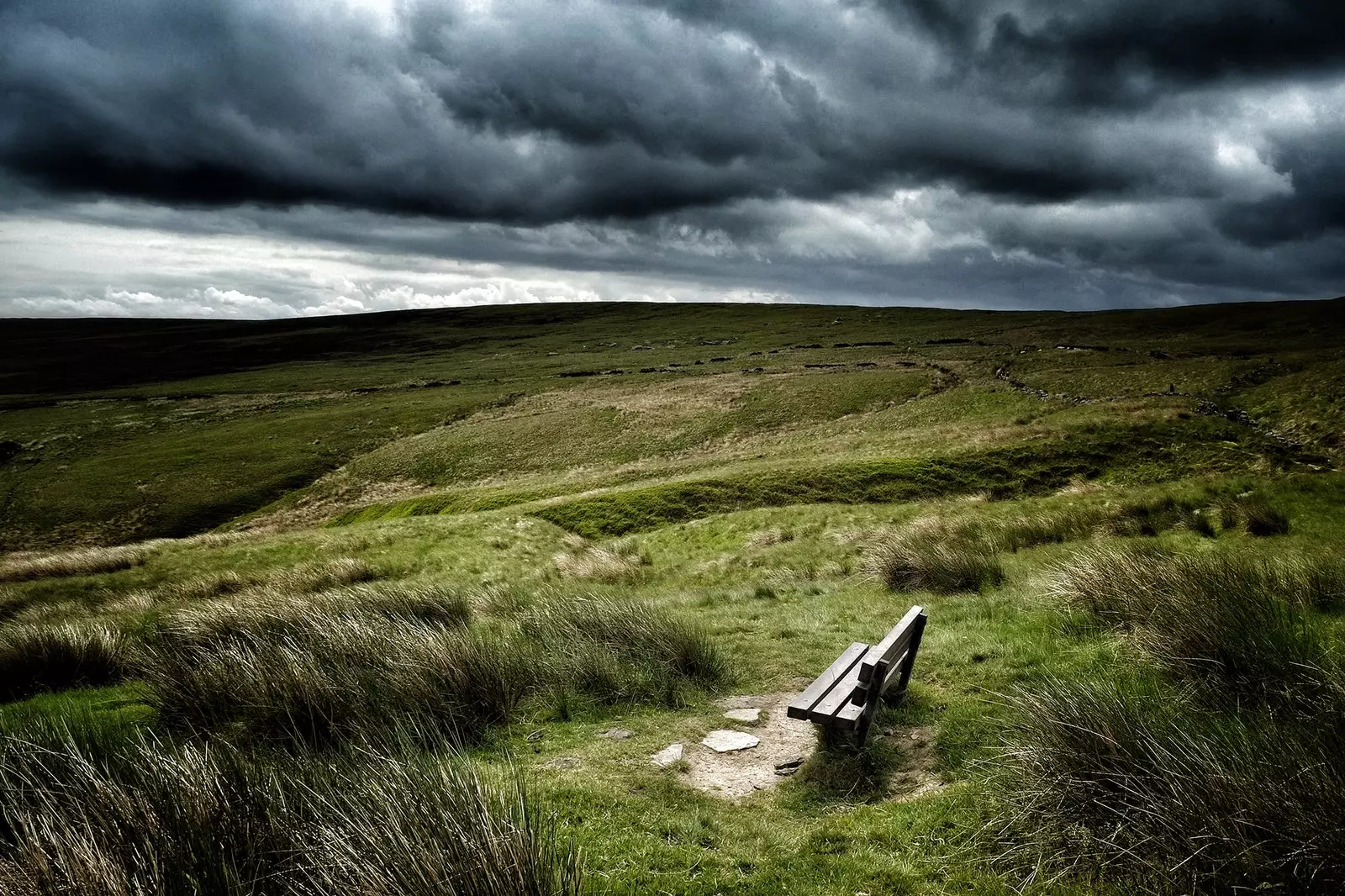
bench in the moors
“This is truly a beautiful region. I do not think that I could have noticed in all England in a place so completely removed from the madding crowd; It is a perfect paradise for misanthropes…”. Mr Lockwood. Wuthering Heights.
That tree loves solitude . That is why he left the forest, to grow withdrawn in the moors. But it takes a lot of strength to be solitary, to hold on firmly with the roots to the ground... because there nobody protects you from the blows of the wind.
Emily Bronte It was like that tree: loved the solitude, the solitude of the haworth moors , a town lost in the West Riding of Yorkshire that she met the fame of the writer and her sisters, charlotte Y Anne .
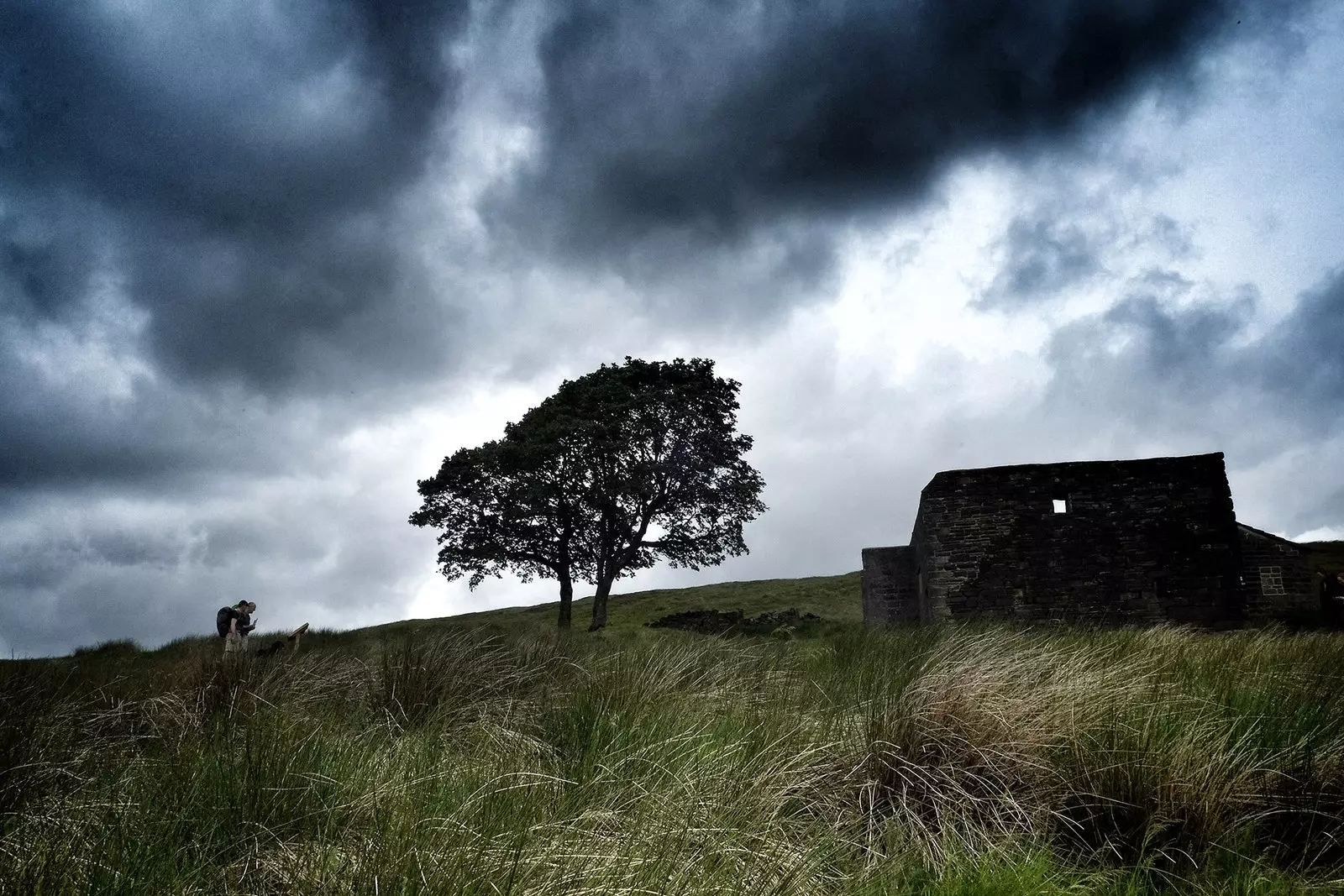
The Moors, or the Wuthering Heights by Emily Brontë
The first was still alive when the first tourists arrived; they wanted to see the place where fashionable authors had grown up, just like this lady, who has come expressly from Georgia, United States (under the strong recommendation of her cousin, it must be said) and without knowing any of her books beforehand. "Oh, but now I'll read them all, all, all ”, She promises, excitedly under the influence of her visit to the Parsonage , the rectory where the reverend resided Patrick Bronte with his family.
There are ink stains on the dining room table. Emily's pen was always jamming. She sometimes studied in the kitchen, a German grammar, while she kneaded the bread, paper and pencil by hand, in case she came up with some stewing verses. Freshly baked poetry, she smelled like apple pie. But the delights that inspired him were beyond the window. A branch hits the glass, as if she cried out to him.
To the moors, to the moors where every ravine
stood sunny under the open sky!
Towards the moors, where the sparrow was chirping (...) !
Where the lark, the wild lark was filling
her breast and ours of infinite delight!
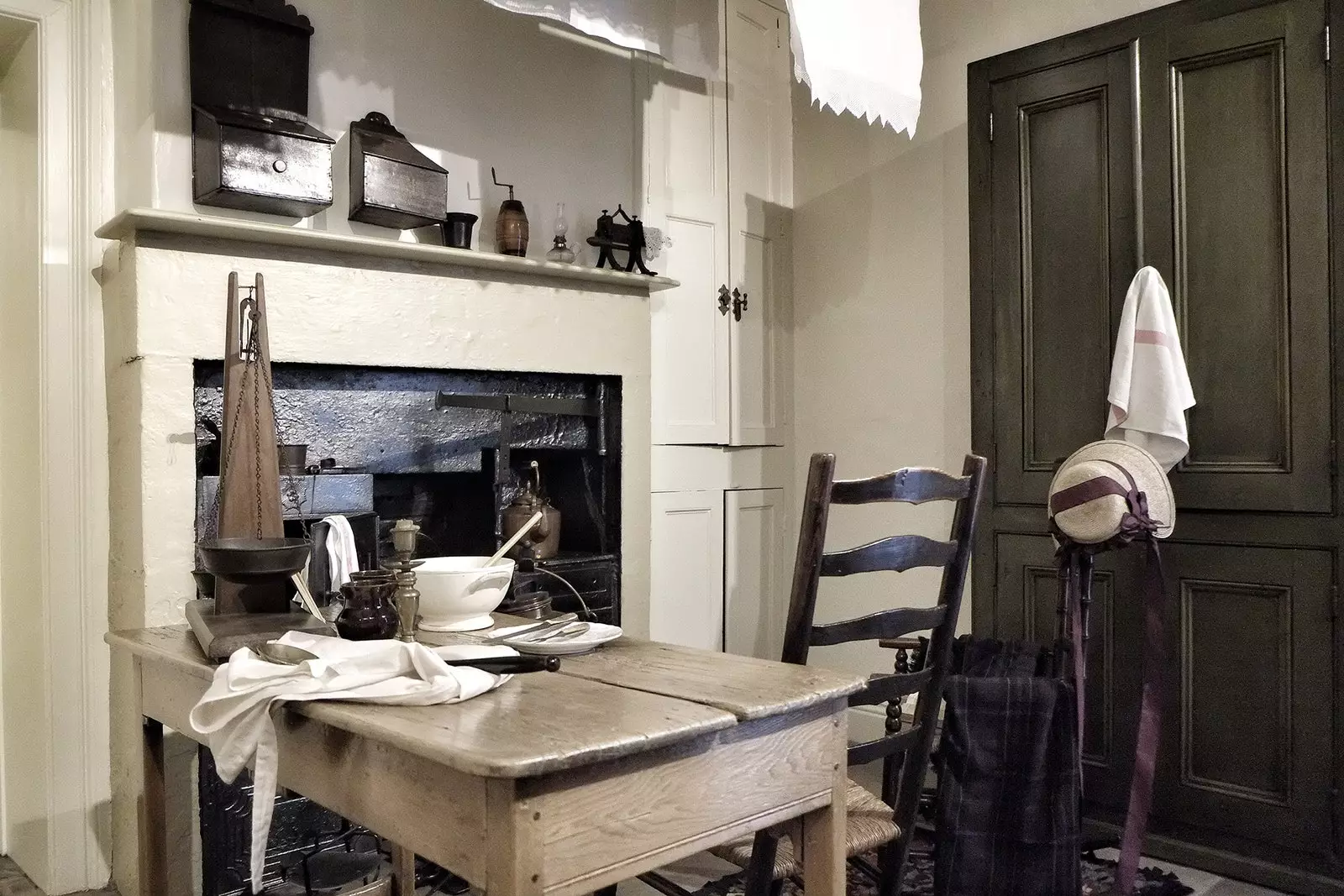
Parsonage's kitchen
The moors are reached by a miserly path , just behind the house-museum, past gates too narrow for broad-hipped fellows, like sheep, loaded down with wool in their holsters. They are still to be sheared.
Summer takes a long time to come in here, it pays a short visit, as a formality, it brings bluebells and yellow lilies and fuchsia orchids and wild rose bushes and gluttonous blackberries and lynxes and mazes and heather and more heather with the handsome russet color… And so, With so much gift, they forget for a while, briefly, the dark days of december.
What will the day be like, bright or cloudy?
She woke up calm, but the sky may shake with thunder
just before sunset.
whatever the weather, Emily went out into the country for a walk, sometimes with Charlotte, sometimes with Anne. As they were girls, her brother Branwell had to accompany them; he was frowned upon for women to go for a walk alone, it was a promiscuity , use her legs to walk, that her lungs would wheeze breaths of freedom.
The neighbors had to get used to seeing her pass , like a wandering (extra) shadow outlined by the sun, tall, skinny, stooped, stretching out over the pastures with strides, wearing the same heavy boots he would have worn Ellis Bell, the male pseudonym with which she shared initials to sign her writings , because she also did not advise a young lady to be disturbed by pretending to pursue a literary career.
She had a small stool with her (because there were no benches to sit on and tell the story then) and a portable rosewood, shoebox-sized, lap-mounted secretary.
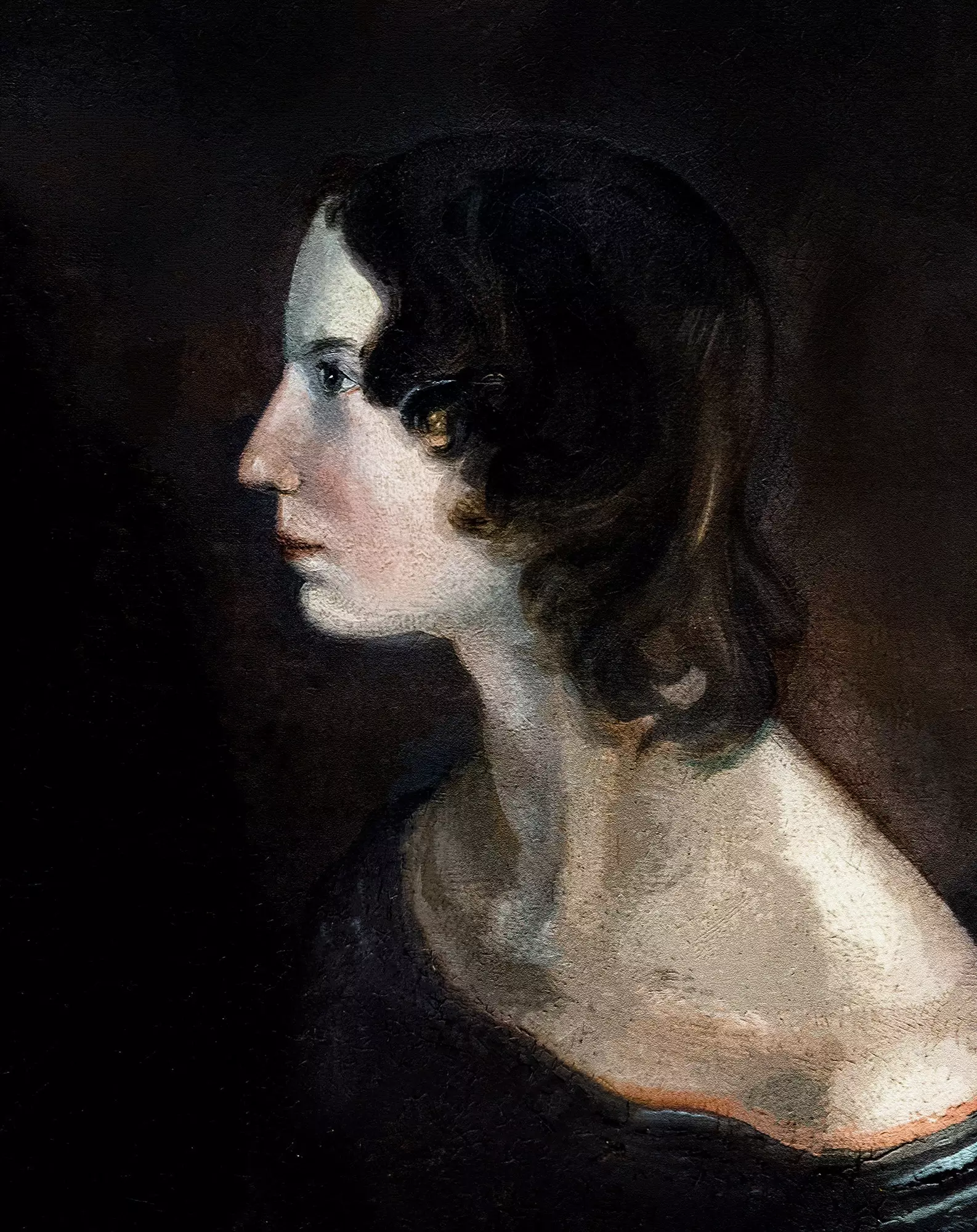
Portrait of Emily Brontë after a painting by her brother, Patrick Branwell Brontë
Lying on the sunny hillside,
Alone, one summer afternoon...
It seemed to me that the air I breathed
was full of divine sparks
and that my heather bed was adorned
with a heavenly glow.
His secret hideout in the moors it was a trough which ceased to be secret when they indicated the route with arrows (in English and Japanese) .
all straight direction Bronte Waterfalls , until you find a tiny stream that jumps aspiring to be a waterfall and stops, exhausted, to rest in a pool, under the Brontë Bridge, which is what they call that bridge there. La Brontë Chair it's that boulder over there, designed as for suffocated asses . They say it's where Emily used to get comfortable drawing and reading and “hear the flow of the waters… murmuring softly”.
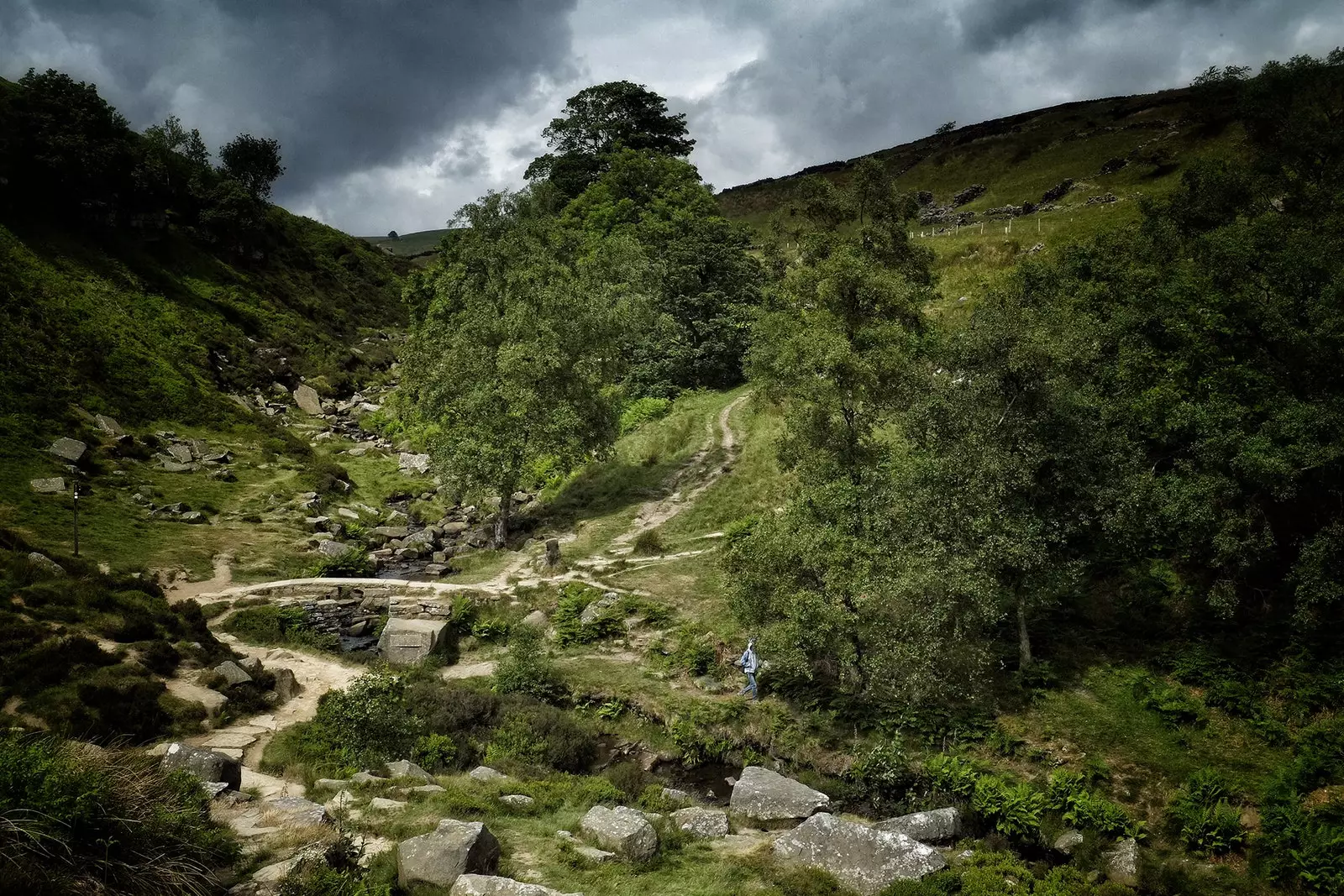
Emily's favorite place on the moors
He also played catch tadpoles with his hands. “Each living being must act as a relentless instrument of death for others or perish” , he blurted out once. Darwin published something similar decades later.
It is the unforgiving law of nature: only the tough survive . Hard is the limestone that covers the river bed and the blackened facades. And hard were the men who extracted them in the mines. Hard are the walls that contain the gusts of November. Hard the bush that pricks and hard the tree, the lonely one, martyred by the blows of the wind. But harder still the wind, that devastates without explanation or reason; it emerges from nowhere like a madman who wanders in rage without destiny, dragging leaden torments.
"It resounds with such hideous wrath, such unearthly grandeur, that one is tempted to believe it is the Voice of the spirits speaking in the tempest."
He drops a drop and bends the blade, hurt by someone he loves so much. His nerves tremble at how loud the thunder persists. **Thunder is what Brontë means in Greek (βροντή) **, stormy name that the reverend Patrick adopted as a Latin student at Cambridge (before he was surnamed Brunty or Prunty…) . Hard must have been his humble Irish origin.
And tough was Emily , who learned to shoot like a war veteran and loved the detonation of storms. The people who congenial with the atmospheric furies are hard. And tough those two ladies , who must be an age now and look at them, they are training to cross the north of England from east to west, one hundred and ninety-two miles that, in kilometers —three hundred and nine— seem even more demanding.
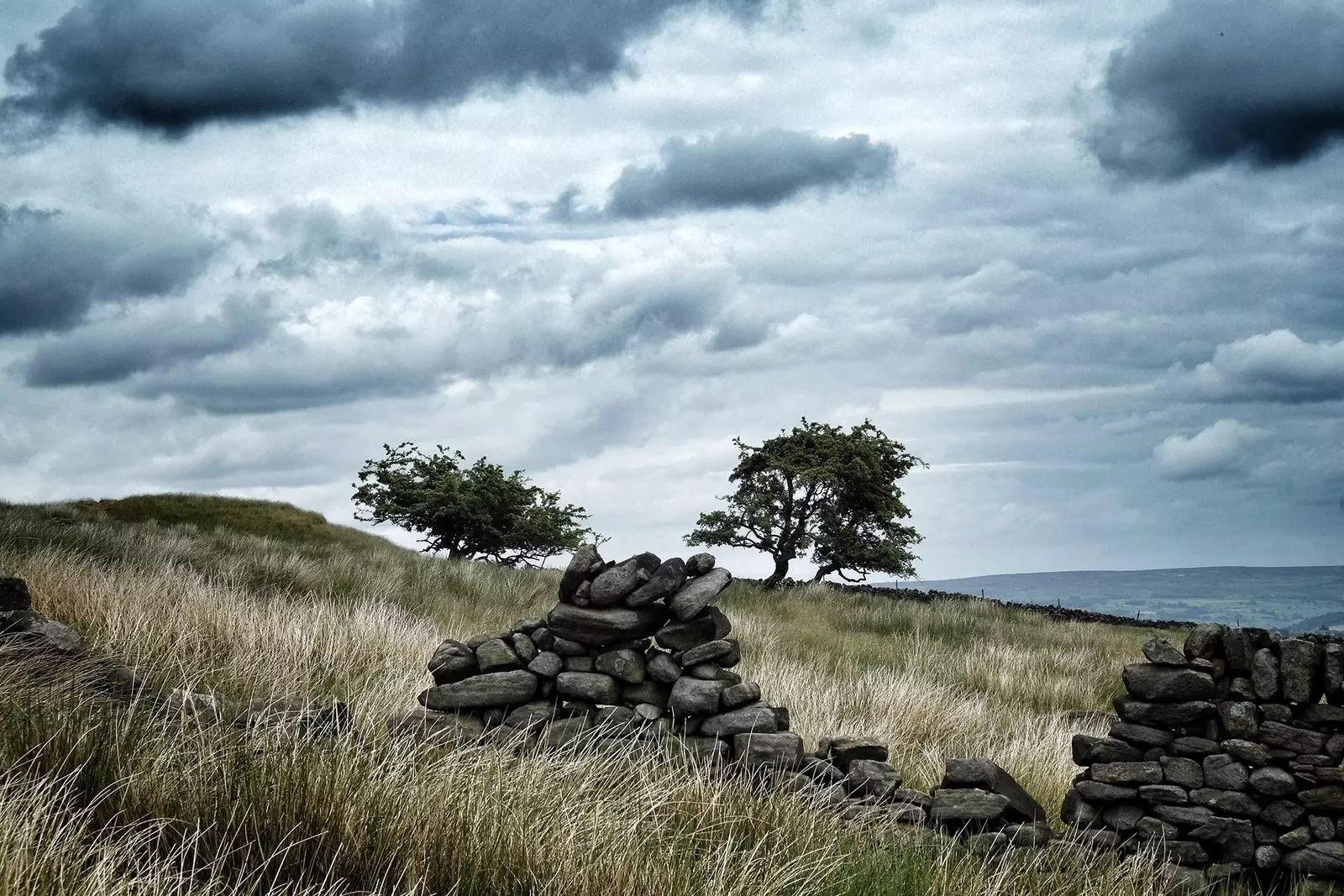
Ruins in the Wastes
They continue at a good pace Top Withins , in the elevated region of the moors, where the earth rises to the sky and the sky descends to the earth and the pulse begins to beat. Curses fall into the void, because where silence dwells there are no ears to hear . Neither eye nor human desire that can delimit the barren and more barren that extend below, homeless , nor the clouds and more clouds that rack up on high.
Beauty cannot be embraced. What is not seen reveals the truth . That invisible song is the lark... or the pert sparrow... or the capercaillie... or the treeless linnet... or the stonechat or the robin or the curlew! Let someone who understands trills guess it. Hero was the falcon that Emily found wounded and tamed..
What bird could fly with a broken wing?
What bloody heart could rejoice?
She adored animals. Apart from their inseparable keeper (“an amalgamation of every English dog species from the turnspit to the sheepdog, with the Haworth factor of originality added”) and of Flossy (Anne's spaniel), were dick the canary ; Tom and Tiger, the cats, the Victoria and Adelaide geese (baptized in honor of the two queens of England, niece and aunt), and the Rainbow, Diamond, Snowflake and Jasper pheasants.
Being a governess in Halifax, she freely confessed that the only being she felt attached to in that school was the dog, to the obvious detriment of the student body. She lasted six months in that job. She only felt free in the moors, where no one and nothing put limits on her. The hills do not mark borders that separate the beautiful from the horrible.
When winter returns
where are all these luminous things?
All gone, like a banal vision,
an unreal pantomime!
These birds that sing so carefree
They will fly through dry and frozen deserts,
poor specters of the destroyed spring,
in starving flocks.
And why should we be joyful, after all?
The leaf is barely green
when the first signs of his downfall
appear on its surface!
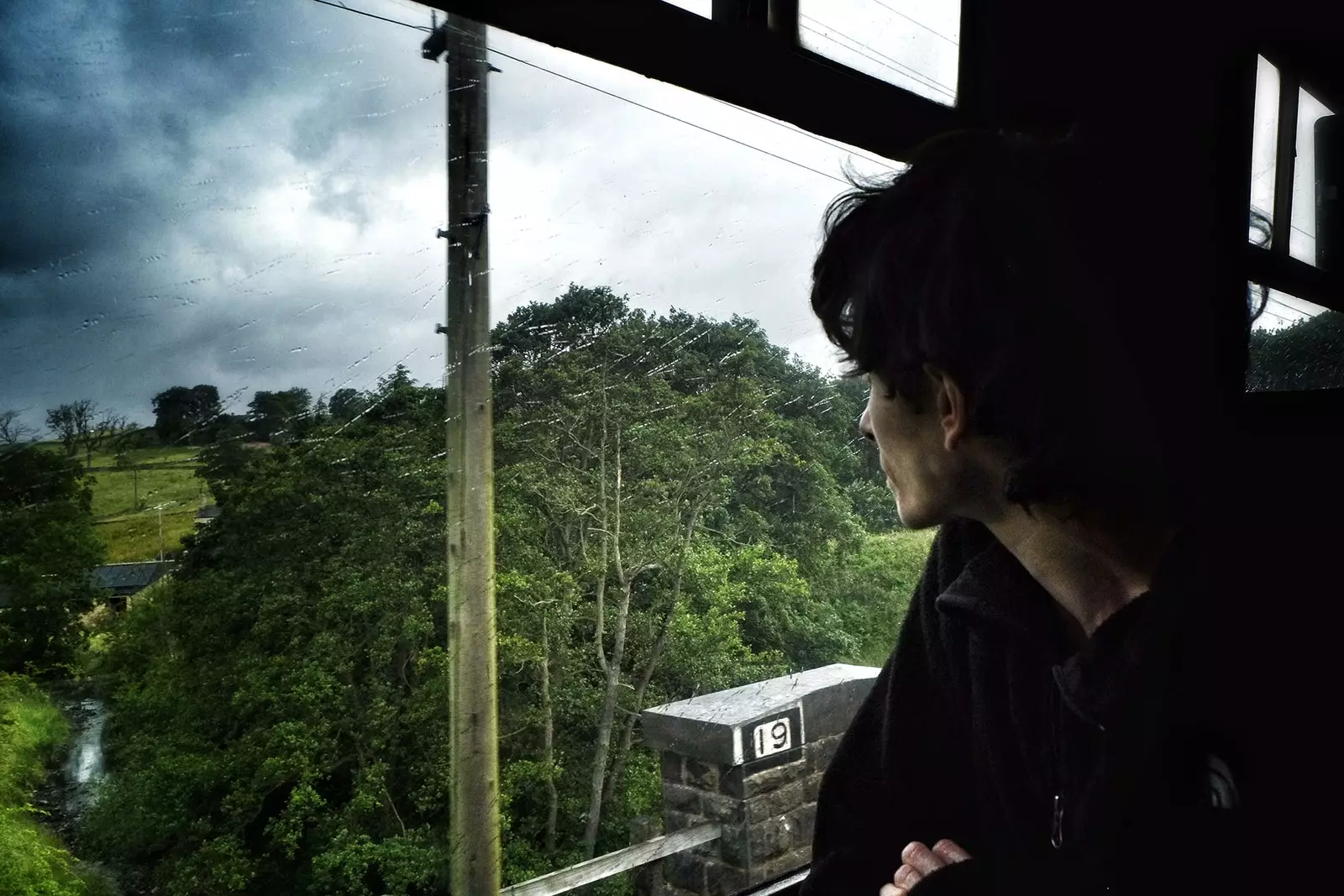
Meritxell from the train
Although the summer is gone Emily's verses will keep their greenness . The volume of complete poetry edited by Alba is perfect for keeping leaflets of Pteridium aquilinum among its 568 pages.
The Brontë sisters also captured small treasures on their walks: a lapwing feather, a ruffling fleece, a piece of moss, a pebble, a bouquet of lingonberries… and the ferns that festoon streams and rocky precipices.
There was such a fever for fronds wordsworthian , that certain species almost became extinct in some areas of Great Britain. They believed that their seeds made you invisible , and that wherever this plant appeared, a fairy had been. But be careful not to step on them (the plants, well, and also the fairies), because the travelers who did so would get lost. Currently, superstitions are refuted with signs.
The slope to Top Withins has no loss . The two hikers are already there, strong, panting with delight, their hair streaked with West component. A storm destroyed the roof and windows of this old farmhouse, desolate in a landscape of falls. Suffice it to say that its stones date from the Tudors, and that they knew more prosperous conditions in the time of the Brontë.
Then there were dozens of farms dedicated to oat cultivation, cattle and wool spinning, which was later sold in Bradford or Halifax . Most are dismembered ruins, abandoned for too many years to get nostalgic.
Tell me, tell me, smiling creature,
What does the past look like to you?
To a mild and warm autumn afternoon
with a wind that sighs sweetly.
Tell me, what is the present hour?
A green and flowering branch
where a little bird sits down to gather strength
to rise up and take flight.
And what is the happy future?
A sea under a cloudless sun,
a mighty sea, magnificent and dazzling,
stretching into infinity.
It follows that this is the plateau where Emily located the gloomy mansion of the Earnshaw, Wuthering Heights ( Wuthering means something like "stormy" in the Yorkshire dialect). “One imagines the strength of the north wind when it blows over the edge of the mountain, by the excessive inclination of some dwarf fir trees at the end of the house and by a row of skinny thorns that extend their limbs in one direction. , as begging for sunlight, observed in the novel Mr. Lockwood.
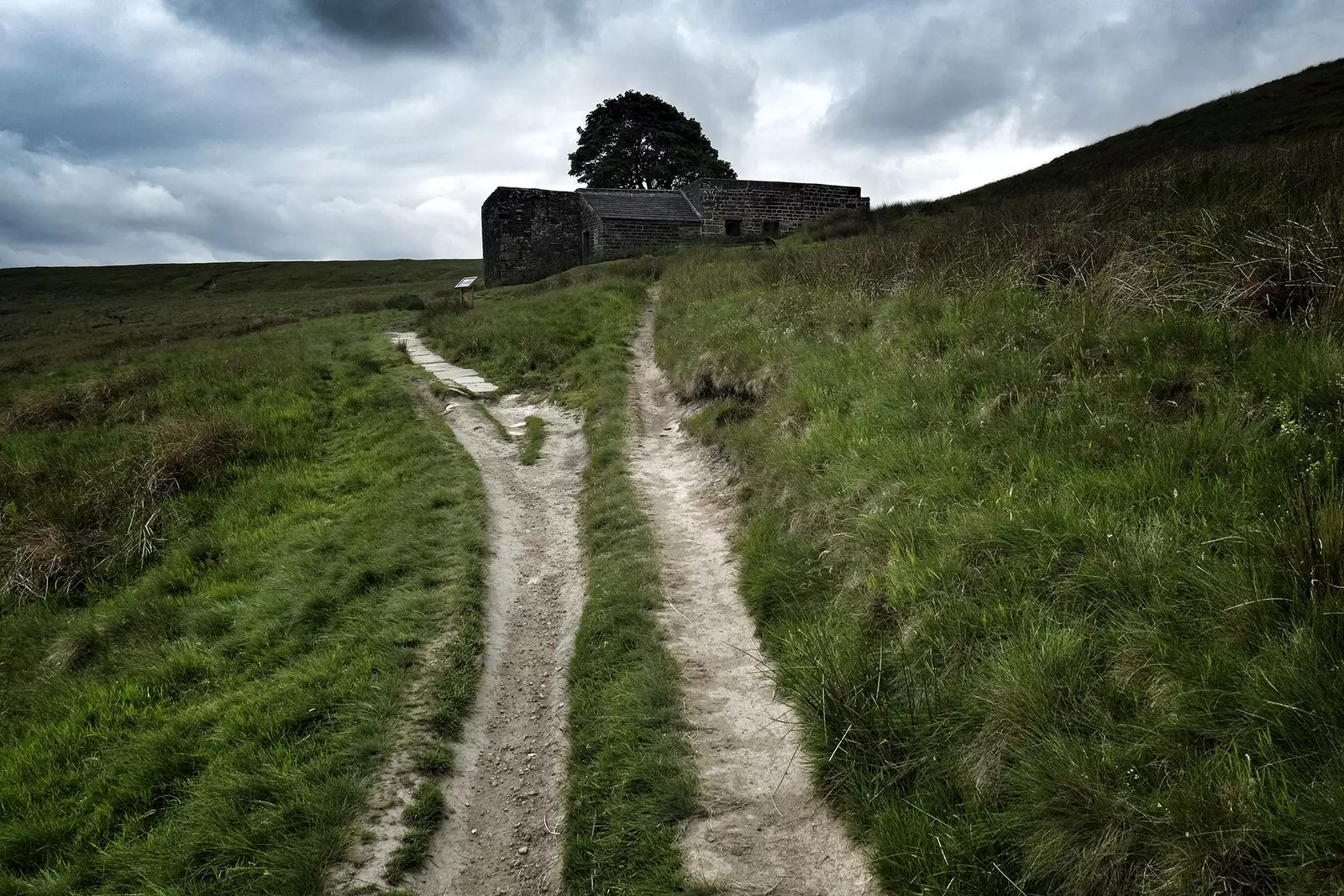
Road to Top Withins
At the rear of the building, the ground advances roughly toward Delft Hill (444m), without gallant bridges to ford streams, passing through heaths as they give them swampy... until reaching the Catherine's Enchanted Cave , under the Penistone Crag , which is actually called ponder kirk even though there is no church there. Just a rocky outcrop with a matchmaking hole and the belief that whoever walks through it won't die single Which Emily wouldn't care about, of course.
She is not known for any affair, but they say that there was something between her and Robert, the oldest of the Heatons , Trustees of Haworth Parish. It is true that she went to visit them very often at her farm, but what she was interested in was not so much any of her children as the brood of books They had the biggest library in the county and they always lent him some gothic story to borrow.
She knew that mansion so well, that it is not surprising that she will use it as a model for the Thrush Farm . It is about two kilometers from ponder kirk , on the neighboring hamlet of Stanbury , and it is a great place for the walker's feet to rest.
julie akhurst she has lived for twenty years in this residence that she has conditioned as B&B to the delight of fans of the Brontë universe like her. “The first time I saw the house I had no idea of its relationship with wuthering heights , because there is no plaque outside…” Just a number: 1801, the date it was rebuilt and the date Heathcliff's spooky story begins, coincidentally or not.
“My husband and I were trekking through the moors when we found her. Look, Steve, and This is the kind of place I would like to live in, I told him . Wouldn't that be a great place to raise a family?
They have two children who help them serve breakfast. perform guided tours at £15 per person, afternoon tea included : scones with jam and clotted cream, cakes, sandwiches and Yorkshire tea. They also give workshops on writing, poetry, photography... in collaboration with the Bronte Parsonage Museum.
The lady from Georgia would love it; someone has to tell him. sleep in the Cathy's Suite It costs £180 a night. Sleep brings me no rest. The shadow of the dead, which my waking eyes can never see, surround my bed. The bed in the room is a reproduction of the protagonist's claustrophobic oak paneled bed ; there is also your scribbled Bible, and the window, and the nightmares that pound on the window. “Let me in, let me in…! It's been twenty years since I lost myself…” pleaded the banshee of Catherine Earnshaw. The scream wouldn't be so shocking if Emily's older sister, Maria, hadn't been dead for two decades by then.
"There are two ghosts in Ponden Hall ”, Warns the hostess to her guests. “The first is known as gytrash…” Typical spectrum of the North of England that, according to the Oxford English Dictionary , appears in animal form, generally ( He has already been seen in Jane Eyre and in Harry Potter ) .
"In our case it takes on the appearance of a barrel of fire rolling down the hillside, touching the wall of the house and disappearing." Funny... "It's supposed to bring a bad omen... The second legend is more terrifying: it's about a monstrous man, with a gray beard and a lantern that..."
What is so monstrous about a grey-haired bearded man who… “…who stops in front of the garden gate when there is going to be a death in the family! The Heatons were so frightened by this spirit that they called in an exorcist to get rid of it. He was last seen in 1898, when the last direct descendant of the Heatons who inhabited Ponden Hall passed away."
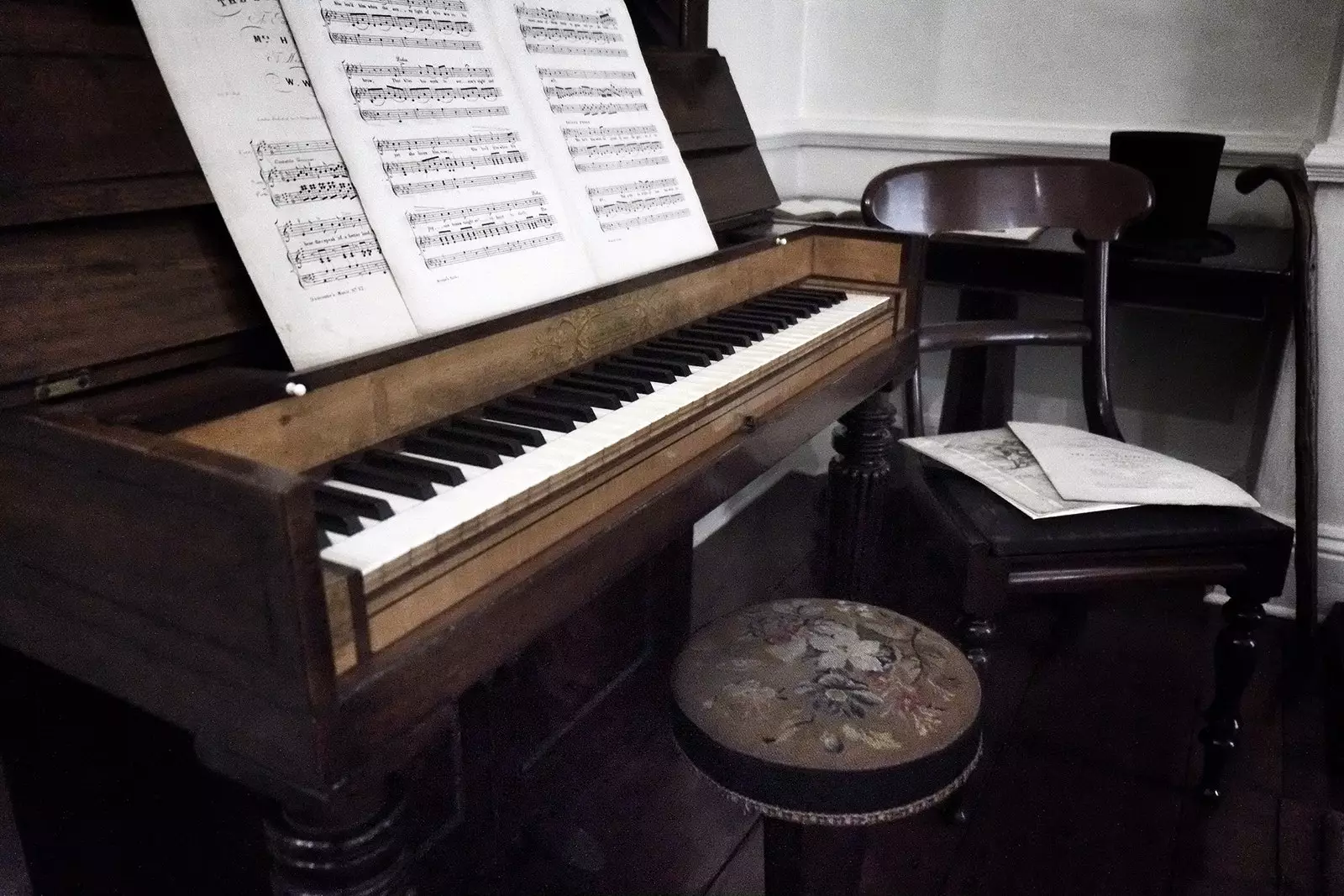
The authentic piano of the Brontë
It was the time of the afternoon when the ghosts that left could return to their imprisoned dust to lament and mourn their unfortunate sentence... It was the time when the day blends so tenderly with the night that you hardly know who ends and who begins. the caress
The moors are moistened with dew. The tree, the lonely one, dances alone with the breeze. The light cools and the flowers curl up. The birds are silent and the sheep taciturnly seek the fold. The last bus leaves for Haworth from Stanbury. If the excursion through the moors takes longer, it is very likely that the shops in town will be closed on the way back (at five o'clock they lower the blinds).
Already in the 19th century they were all agglomerated on the cobblestones of Main Street, the steepest street in England, if local hype is to be taken for good. The buildings have hardly changed from the outside. Where there are now shops, art galleries, bookstores, cafes, restaurants... before there was no shortage of wool combers, weavers, butchers, cabinet makers, milliners … the Mr. Greenwood's stationery, where the Brontë they stocked up for their vices, and the pharmacy where Branwell shopped opium, in laudanum or in pill form , at sixpence a pack, as medicine for his romantic and artistic frustrations (it was also prescribed for coughs and diarrhoea).
The place still retains its apothecary atmosphere, but today they sell handmade soaps and bath salts with a macabre punk design. Also shaving lotions and potions, and all kinds of gifts inspired by the old cabinets of curiosities: palmistry hands, phrenological heads, somatological dioramas, anatomical tableware, entomological mugs, botanical candles, butterfly showcases...
right in front is The Black Bull , the tavern where the Brontë's wayward brother swallowed his woes, to the delight of the current concessionaire, who is pleased to have been his favorite pub, probably because it caught him next to home and, consequently, next to the cemetery . In his conditions he could not have gone much further.
Father Brontë was exacerbated. Let the women of the town dry the laundry on the tombstones.
And what if our footsteps walk over the dead?
They doze undisturbed in the grave.
And why do mortals fear to venture
along the path that leads to your future home?
It is estimated that there are about forty (or fifty or sixty) thousand corpses. Now they only bury the ashes of those who have a buried relative. The clouds mourn the names shrouded under the moss.
To John Brown, the marble mason , he did not lack work: 40% of the population died before the age of six . Mortality rates were no match for Whitechapel and London's most unhealthy neighborhoods: twenty-four lares shared the same toilet in the most deplorable of cases. The bells were ringing routinely for the deceased.
Good and Evil writhing dumb, below the most sterile worms, where it is always cold, where it is always dark, hair entangled in a labyrinth of roots, with no possible escape. Such an overcrowding of tombs was reached that the cemetery was closed by royal order. The souls in putrefaction contaminated the well with cholera and typhus, and thus the dead took the living with them, because they feared that solitude that is an abyss when you have not chosen it.
Emily died at the age of thirty. She from a tuberculous cold. She was on the black sofa in the dining room, the one with horsehair that the lady from Georgia photographs. In the rectory. Her legs no longer had the strength to climb the stairs to her room. The west wind carried her away. Like the leaves of the tree, the lonely. They lie green; a gale uprooted them before September withered them.
“I lingered under that balmy sky, watched the winglets fluttering among heather and bluebells, listening to the gentle breeze rustle through the grass, and wondered how anyone could attribute restless dreams to those who slept under so still land.” Mr Lockwood. Wuthering Heights.
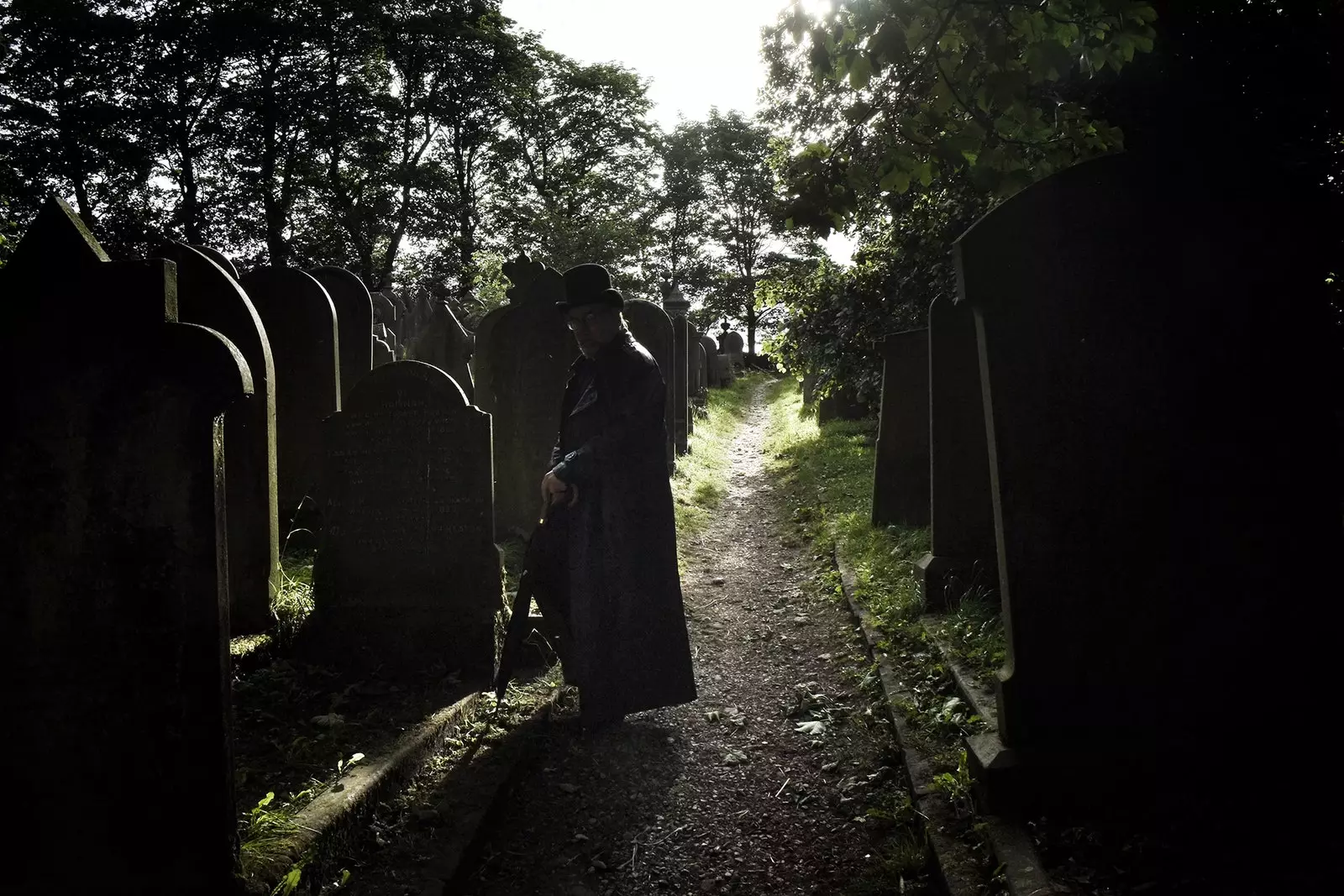
Martin in the graveyard
HAWORTH PRACTICAL GUIDE
How to get. You have to ** fly to Manchester with Iberia Express **, because the crew treats you very well and the company beats British punctuality to the train that you have to catch later, towards Hebden Bridge. From here to Haworth, by bus. And not to complain, that they had it much more complicated before, when the only means of transportation was the wagon. The Brontës, however, did not have a carriage; thus, there were days when Reverend Patrick had to walk more than forty miles to attend to his parishioners.
Where to sleep. In weavers , the guest house that Brendan and Josie lovingly run . Tell them they speak slowly, because, especially he, has a burnt Yorkshire accent. The house, built around 1840, is located in the area where the wool weavers, past Main Street. The specter of Emily Brontë appears in the room every December 19, the date of her death. That's what Martin, the ghost tour guide says; but The writer's spirit must be as shy as she was in life, because neither Brendan nor Josie have seen it yet. . The only one who shows up is the milkman, Stanley, who is in his eighties and continues to deliver fresh milk every morning.
Where to eat. Martin says there is another ghost in The Old White Lion . In this case, that of a balloonist, Lily Cove , who died in a balloon accident at the beginning of the 20th century and who was staying in room number 7 of this historic hotel. Spirits aside, it's a good place to eat. What The Hawthorn , which was once the Georgian home of Mr Barraclough, the village watchmaker. It was he who made the grandfather clock that still strikes the hours in the rectory of the Bronte.
Other samples of his work can be seen in the same restaurant. Daily menu from 14.50 euros, with meat from the Yorkshire Dales and the Lake District and fresh fish from Hartlepool. Nothing bad can come out of a chef named Tim Kitchen.
For a snack, you are going to Villette (the cafeteria with the same name as the novel by Charlotte Brontë) and order a Yorkshire parkin, a cake famous for these surroundings. And for the last drink, ** The Kings Arms **, where in addition to poltergeist (their basement was formerly a warehouse for corpses), they serve cocktails and Brontë-inspired beers as we toast to Emily's 200th Anniversary.
To do. Get lost in the moors with a route through the ** Pennines ** and not let anyone find us. But you have to remember to visit the Parsonage Museum , the cemetery and the church of St Michael and All Angels, although Emily was not much of a mass… All the members of the family rest in the crypt except little Anne, who died in Scarborough and they decided to bury her there, perhaps to avoid the suffering of a widowed father who saw her six children die.
Where to buy. the neighbors of Brontëland They immediately realized that they could make extra money with literary tourism. So many supposed Brontë pianos came to light that, had they all been authentic, in every room of the rectory there would have been one of these instruments. Patrick, for his part, chopped letters from Charlotte into fragments that he sent to all corners of the globe to satisfy the many readers of Jane Eyer. The postman thus became the main supplier of souvenirs.
You can buy a mug that says " Wuthering Rights" in the museum's souvenir shop, but better to browse in a local craft workshop like the one in Sonje Hibbert , whose ceramics are shaped by the same landscapes that captivated Emily.
“The moors are my inspiration . I go for a walk almost every day, especially when the weather is cold and stormy, because the colors shine much brighter with the humidity. I take photographs to work later in my studio and collect herbs that I later use in my paintings”, says the artist. "All the Haworth Dales are exceptional, but Top Withins is my favorite place."
what to read . On the outward flight (taking advantage of the fact that Iberia Express does not bombard you with publicity over the public address), **Emily Brontë's biography written by Winifred Gérin (Atalanta Ediciones)**, and on the return trip, Process to the legend of the Brontë , by Aurora Astor Guardiola (UPV).
In a coffee shop in Haworth, The cabinet of the Brontë sisters , by Déborah Lutz (Siruela Editions). In the moors, the Complete Poetry of Emily Brontë (Dawn Publisher). And at night, before going to bed, wuthering heights (in the Cátedra edition) or in the Alba or in the illustrated edition of Tres Hermanas.
what to hear To Kate Bush singing Wuthering Heights on the very moors of Haworth. A fricate.
